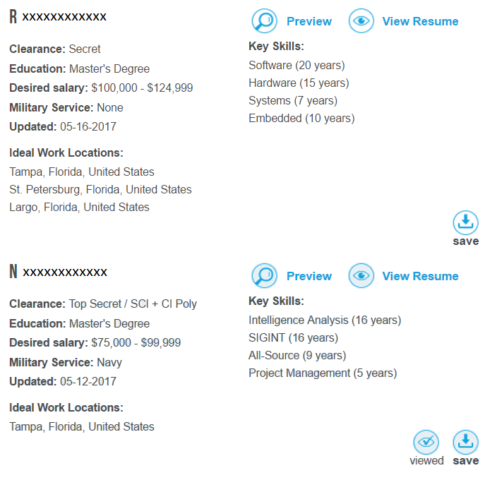 When you search job postings looking for jobs that interest you, you enter a keyword, keyword phrase or Boolean search string.
When you search job postings looking for jobs that interest you, you enter a keyword, keyword phrase or Boolean search string.
The search results you get are not the actual job postings, but a list of job titles with the associated company name, the required security clearance, the location, and the date the job was posted.
Based on those details you decide whether you will click through and read the full job posting. It’s a more efficient way to search than if your search results were the actual job postings that you then had to page through.

On the other side of the fence, recruiters are doing something very similar that you may not have realized.
When a recruiter searches a resume database, they enter a keyword, keyword phrase or Boolean search string, the same as you. But their search results are not your resume. Just as your search results are not job postings. And that’s a critically important point.
The search results a recruiter gets are a list of the demographic details that you entered on your profile. Those demographic details influence whether or not a recruiter will click through and read your resume. That’s why your demographic details are important, and why we encourage you to give some thought to the information on your profile, particularly your Key Skills.
This is a snippet of the search results recruiters see when searching a resume database:

These details are an opportunity for you to entice a recruiter to click through and review your resume. It’s your chance to shine and you’re better served providing specific hard skills for your Key Skills over vague skills or soft skills such as team player or go-getter. Look at the Key Skills provided by R in the first example above vs those provided by N in the second example.
N gives us descriptive and specific skills, SIGINT and All-Source. R provides generic hardware and software. Which Key Skills give you a better and more descriptive picture of the individual at a glance?
And be careful with the abbreviations or acronyms you use here, just as you need to be careful using them on your resume and in an interview. In creating this article I saw a job seeker with FMV listed as a Key Skill. Is that Family of Military Vehicles? Full Motion Video? What exactly is the job seeker trying to communicate?
So put thought into the Key Skills on your profile, and the number of years’ experience you have with each of those skills. Be clear with the information you’re communicating. It’s another chance to sell yourself to a recruiter if the information you give is clear, descriptive and specific.
Bonus Tip: Refresh Your Account
When you create a job seeker profile there is a creation date associated with your account. Each time you log in to your account, that date is updated.
When recruiters search the resume database, their search results are in reverse chronological order. What’s new and fresh — job seekers who have created a profile or recently logged in to their account — is at the top of the recruiter’s search results.
As you see in the example above, Job Seeker R last logged in to his account on May 16, while Job Seeker N last logged in to his account on May 12. That’s why R comes before N in the recruiter’s search results.
If you haven’t logged in to your job seeker account in many months, you may be many pages back in a recruiters’ search results. They may never even get to the page where your information is found, because they may find several qualified candidates before they get to you.
To ensure you’re top of mind and top of search results, log in on a regular basis such as weekly or monthly, when you’re active in your job search.
All you need to do is log in to your account. That updates the date associated with your profile, and let’s recruiters know you’re still in the job search game.
Many recruiters also have saved search strings that fire for new or “fresh” job seekers, just as you may have a job alert set up for new jobs that are posted to ClearedJobs.Net that meet your search criteria. When you refresh your profile, you’ll appear in that recruiter’s daily email of job seekers that meet their search criteria. Another way to get your name in front of the people who can get you hired.